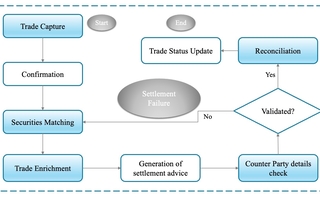Waters Wrap: On SVB, Credit Suisse and questions left in the wake
After the latest 'crisis' that claimed Silicon Valley Bank, Credit Suisse and others, Anthony questions whether anyone will learn a lesson.

Need to know
Update 3/30: As mentioned below, Max Bowie wrote about what data execs can expect from the UBS–Credit Suisse merger. Click here to read more.
My first job in New York City was as a junior reporter at a publication called American Banker, writing for the newspaper’s monthly magazine. I joined them in September 2007 … right as the subprime mortgage crisis was beginning to brew below the surface.
Because I was a newbie making a relatively low salary, I was able to keep my job at a time when many talented journalists and editors—including my wonderful editor, Holly Sraeel—lost theirs. But, a bit callously, the upside for me (besides having money to pay rent) was that I got to cover the banking industry during a period of tremendous upheaval. And to be sure, the Financial Crisis provided a bottomless well of stories to write. In some ways, we’re still writing them.
So when Silicon Valley Bank (SVB) melted down, and Signature Bank failed, and Credit Suisse was bought by UBS for pennies on the dollar, I started to think about what stories we could write to help our readers navigate the storm. If I’m being honest, though, for the last couple of weeks, I’ve been drawing blanks. So this column will be more of a brainstorming session with our readership for topics and stories that you’d like to see here.
First, some context: The vast majority of WatersTechnology subscribers fall into one of two buckets. The first is filled with the technologists and engineers that oversee the building and managing of trading platforms, risk systems, and/or back-office technologies. The second (and slightly larger) bucket contains market data and reference data professionals, folks in the world of analytics, and, more generally, data managers.
You can’t start, stop and restart tech modernization projects or initiatives to improve a firm’s data lineage or data quality efforts.
For those two audiences, there’s a wealth of stories that can be written to satisfy their most obvious needs. But when it comes to the current market turmoil we’re experiencing, those stories specific to our audience feel … tired.
There will be a battle for laid-off talent. Max Bowie is working on a story that will look at what became of, specifically, data professionals after the 2008 Financial Crisis and see if there are any parallels or lessons to be learned. (If you have thoughts on that, hit him up: max.bowie@infopro-digital.com.)
On the talent loss idea, perhaps there’s something to be said for the fact that the back office has taken it on the chin with the round of bank layoffs that began even before SVB’s collapse. If there are more layoffs in the back office as a result of this turmoil, or if inventive startups struggle to get additional funding, that could further set back an already underfunded part of the capital markets.
Additionally, startups were already experiencing a tough funding market, and recent events will cause them further struggle to shore up much-needed capital, at least in the near term. It’s an interesting story, but one that is not exclusive to financial technology providers. We might tease this out some more if we can find a new or underreported angle, but I’m not getting my hopes up.
There have been large spikes in trading volume over the last few weeks, and we already saw what kind of turmoil that can cause during the early days of Covid. It doesn’t seem (to my knowledge, anyway) like any industry vendor had a major outage related to an unexpected volume spike.
And, of course, there are always future regulatory questions at stake. “How do you really have a risk program that looks through to your banks?” asked one source I spoke with recently. “My view is that the government should really step in here as it is impossible for everyone to do a thorough vetting of their banks’ risk management.” It’s an interesting angle, but at this point, it’s all speculation.
I actually reached out to a dozen sources who have always been outside-the-box thinkers, and there were a couple of ideas presented that we’ll look into, but of those, most were quite niche or way … way … out there. (And I love those conversations, but I can’t dedicate resources to “Big Foot” ideas without more evidence.)
If there’s a lesson to be learned here, I think it’s this: You can’t start, stop and restart tech modernization projects or initiatives to improve a firm’s data lineage or data quality efforts. You need to keep experimenting with innovative new technologies, or else risk falling behind in the game of discovery. Firms are still struggling with how best to move to the cloud. The buy-vs.-build debate is only becoming more complex, and it’s important to keep intelligent people in the fold to make those decisions. These things cannot fall to the back burner because of current—but temporary—disruption.
I love my readers
A bit of a non-sequitur, but let me just say (well, write) this personal note to you, the reader: I know many people who are indifferent toward their jobs, or even hate their jobs—it’s a paycheck to pay bills and buy stuff. Me? I LOVE journalism, and I LOVE my job. Journalism is a tough gig and most reporters wash out soon after college or get laid off and can never find a new job after. So many more are hustling like crazy, piecing together one freelance check after another. Journalism is not for the faint of heart.
I often get asked, “Don’t you want to write for the [fill in major news outlet here]?” I’m being 100% honest here—I’ve turned down more lucrative jobs at outlets that have much larger name recognition than WatersTechnology. I stay here because I love the people I work with. Their dedication to the job often floors me, and their understanding of my “mental issues” makes me want to cry (in a wonderful way, of course).
But when it comes to the work itself, what I love most about writing for WatersTechnology is that this is basically a community newspaper, but the community extends across the globe. It’s a niche audience that cares very deeply about the work that they do, and they’re seeking information that will help them do their jobs better or be more informed on a subject they care about. Because of that, I never feel pressure to write clickbait bullshit. I don’t have to gin up stories or headlines.
“Journalism” is a loosely used term nowadays—take “Williamsburg Hipster Beards are Becoming the Norm in DC!” for example. Those stories destroy souls and ruin credibility. I don’t have to write those. This may come off as macabre, but I never want to retire—I hope to be typing up an article and fall dead at my keyboard (well, that’s the second best scenario. … I’ll gladly take dying in my sleep, please, dear lord). I love this profession. But if I have to write clickbait bullshit, I’ll be out of this business in short order.
This is all to say that I don’t have this job if not for our subscribers. So I take very seriously the need to inform you with useful information. If you feel that we have not served you well during these last few weeks, as this is the first story we’ve published that mentions SVB or Credit Suisse, I do apologize. And if you think there’s an angle we are missing that hasn’t been reported well in other publications that you read, please reach out to me and let me know: anthony.malakian@infopro-digital.com
Finally, just because we haven’t written anything about the latest bank run yet doesn’t mean we won’t. We just want to take our time and make sure it’s worthy of our high price tag and is useful to you. If you have thoughts/questions/concerns, I’m here.
The image accompanying this column is “Ruin by the Sea” by Arnold Böcklin courtesy of the Cleveland Museum of Art’s open-access program.
Only users who have a paid subscription or are part of a corporate subscription are able to print or copy content.
To access these options, along with all other subscription benefits, please contact info@waterstechnology.com or view our subscription options here: http://subscriptions.waterstechnology.com/subscribe
You are currently unable to print this content. Please contact info@waterstechnology.com to find out more.
You are currently unable to copy this content. Please contact info@waterstechnology.com to find out more.
Copyright Infopro Digital Limited. All rights reserved.
You may share this content using our article tools. Printing this content is for the sole use of the Authorised User (named subscriber), as outlined in our terms and conditions - https://www.infopro-insight.com/terms-conditions/insight-subscriptions/
If you would like to purchase additional rights please email info@waterstechnology.com
Copyright Infopro Digital Limited. All rights reserved.
You may share this content using our article tools. Copying this content is for the sole use of the Authorised User (named subscriber), as outlined in our terms and conditions - https://www.infopro-insight.com/terms-conditions/insight-subscriptions/
If you would like to purchase additional rights please email info@waterstechnology.com
More on Emerging Technologies
Quants look to language models to predict market impact
Oxford-Man Institute says LLM-type engine that ‘reads’ order-book messages could help improve execution
The IMD Wrap: Talkin’ ’bout my generation
As a Gen-Xer, Max tells GenAI to get off his lawn—after it's mowed it, watered it and trimmed the shrubs so he can sit back and enjoy it.
This Week: Delta Capita/SSimple, BNY Mellon, DTCC, Broadridge, and more
A summary of the latest financial technology news.
Waters Wavelength Podcast: The issue with corporate actions
Yogita Mehta from SIX joins to discuss the biggest challenges firms face when dealing with corporate actions.
JP Morgan pulls plug on deep learning model for FX algos
The bank has turned to less complex models that are easier to explain to clients.
LSEG-Microsoft products on track for 2024 release
The exchange’s to-do list includes embedding its data, analytics, and workflows in the Microsoft Teams and productivity suite.
Data catalog competition heats up as spending cools
Data catalogs represent a big step toward a shopping experience in the style of Amazon.com or iTunes for market data management and procurement. Here, we take a look at the key players in this space, old and new.
Harnessing generative AI to address security settlement challenges
A new paper from IBM researchers explores settlement challenges and looks at how generative AI can, among other things, identify the underlying cause of an issue and rectify the errors.








